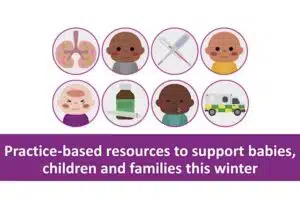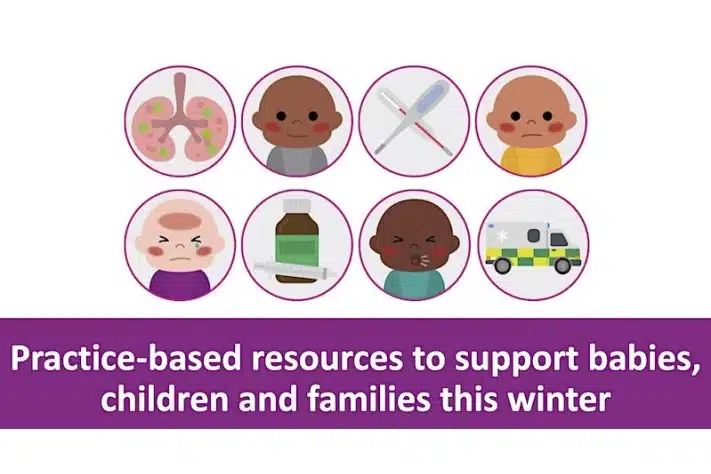From 1 September 2024, there will be two new vaccination programmes against respiratory syncytial virus (RSV) – during pregnancy (for infant protection) and older adults in England, Wales and Northern Ireland, with the rollout in Scotland already commenced in August. The new vaccinations have been introduced following guidance from the Joint Committee on Vaccination and Immunisation (JCVI).
It is important that everyone working in health visiting is aware of the programme and the underpinning evidence, to support their work in promoting RSV vaccine uptake.
Why vaccinate against RSV?
RSV has been described as “maybe the most common virus you have never heard of” by GP and journalist Dr Mark Porter.
RSV causes respiratory illnesses which are most frequently seen over the winter months between November and February1. In the majority of people, it presents as a cough/cold which gets better by itself within 1 or 2 weeks2. However, in vulnerable populations, such as babies under 6-months-old, those born preterm, adults over 75 years and anyone with a weakened immune system, long-term lung or heart conditions, RSV can be much more serious requiring hospitalisation and, in some cases, causing death.
Many babies with RSV infection are undiagnosed, but they will struggle to breathe and feed due to bronchiolitis or pneumonia over the winter months. On average in England, 20,000 infants are admitted to hospitals each winter due to RSV. The vast majority have no underlying medical conditions. Many need intensive care, and sadly 20 to 30 will die due to RSV infection. RSV has wider impacts too, cancelling major paediatric surgery because critical care beds are needed to keep children with RSV breathing.
The maternal vaccine is a major step forward for child health. It offers infants 70% protection against severe RSV lower respiratory tract infection over the most vulnerable first 6 months of life. Commenting on the new vaccination programme, The Royal College of Paediatrics and Child Health has called it “game changing”.
The new RSV schedule – what you need to know:
- Pregnancy
- All women who are at least 28 weeks pregnant on 1 September 2024 should be offered a single dose of the RSV vaccine. After that, pregnant women will become eligible as they reach 28 weeks gestation and remain eligible up to birth. The ideal opportunity to offer vaccination would be at the 28-week antenatal contact, following prior discussion about the vaccine earlier in pregnancy. Providers should aim to vaccinate those already eligible on 1 September as soon as possible.
- Older adults
- All adults will be offered the vaccination at 75-years-old.
- There will be a catch-up programme which will start for those aged 75–79-years-old on 1 September 2024.
- They will remain eligible until the day before their 80th birthday, with the aim to complete the catch-up programme by the end of August 2025.
It is expected that the majority of the two population groups will have their vaccinations in September and October in preparation for the start of the RSV season.
Role of the health visitor
It is important that health visitors and their teams are aware of these new vaccination programmes. They are ideally placed to have conversations about the benefits of the maternal vaccination during the antenatal and interpregnancy periods, to ensure families who are pregnant or are planning a pregnancy are aware of the new RSV vaccination and how it protects babies. Through their extensive reach to millions of families across the UK each year, they can also play an important role in raising awareness of the new older adult vaccination programme for extended family members, or with grandparents helping with childcare. They are in the ideal place to explain to families what the new programme is, answer any questions that they may have, and direct them to the GP surgery for more information. This will help to protect the whole family, offering lifesaving protection against RSV for young babies and other vulnerable groups.
Further information, guidance and resources to support healthcare practitioners and raise awareness of the new RSV vaccination
As there are two new RSV vaccination programmes (one for pregnant women for infant protection and a separate one for older adults), there are different supporting resources available for each. It is important that anyone involved in RSV immunisation, or promoting vaccine uptake, is aware of which resources to use. More details are also available in the green book, chapter 27a: respiratory syncytial virus.
UKHSA and Public Health agencies for the devolved nations have produced several resources to support practitioners in raising awareness of the new programmes. Some of the resources are available in other languages. Follow the links below to access the resources.
- UKHSA Vaccine update: issue 347, July 2024, RSV special (contains important information on training resources, ordering vaccines and healthcare practitioner guidance):
https://www.gov.uk/government/publications/vaccine-update-issue-347-july-2024-rsv-special/vaccine-update-issue-347-july-2024-rsv-special - Health Publications: https://www.healthpublications.gov.uk/Home.html
- Pregnancy
- RSV vaccination of pregnant women for infant protection: information for healthcare practitioners: https://www.gov.uk/government/publications/respiratory-syncytial-virus-rsv-programme-information-for-healthcare-professionals/rsv-vaccination-of-pregnant-women-for-infant-protection-information-for-healthcare-practitioners
- Poster for Pregnant Women:
https://www.healthpublications.gov.uk/ViewProduct.html?sp=Srsvposterforpregnantwomen
- Older adults
- RSV vaccination of older adults: information for healthcare practitioners: https://www.gov.uk/government/publications/respiratory-syncytial-virus-rsv-programme-information-for-healthcare-professionals/rsv-vaccination-of-older-adults-information-for-healthcare-practioners
- Guide to the RSV Vaccine for Older Adults:
https://www.healthpublications.gov.uk/ViewProduct.html?sp=Sguidetothersvvaccineforolderadults
- Scotland: Respiratory syncytial virus (RSV) immunisation, Resources for professionals:
https://publichealthscotland.scot/our-areas-of-work/immunisation-vaccine-and-preventable-disease/immunisations-by-vaccine/respiratory-syncytial-virus-rsv-immunisation/resources-for-professionals/ - Wales: Respiratory syncytial virus (RSV) vaccination information and resources:
https://phw.nhs.wales/topics/immunisation-and-vaccines/respiratory-syncytial-virus-rsv-vaccination-information/ - Northern Ireland: The Public Health Agency is yet to publish their resources, keep an eye on their website for news and publications about the new RSV vaccinations.
References
- UKHAS (2024) What is RSV and is there a vaccine?. Available at: https://ukhsa.blog.gov.uk/2024/07/17/what-is-rsv-and-is-there-a-vaccine/
- NHS (2024) Respiratory syncytial virus (RSV). Available at:
https://www.nhs.uk/conditions/respiratory-syncytial-virus-rsv/





